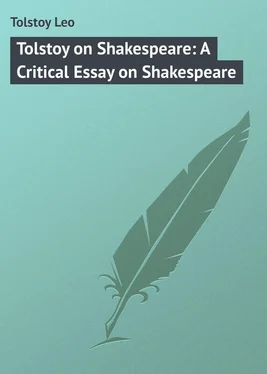Leo Tolstoy - Tolstoy on Shakespeare - A Critical Essay on Shakespeare
Здесь есть возможность читать онлайн «Leo Tolstoy - Tolstoy on Shakespeare - A Critical Essay on Shakespeare» — ознакомительный отрывок электронной книги совершенно бесплатно, а после прочтения отрывка купить полную версию. В некоторых случаях можно слушать аудио, скачать через торрент в формате fb2 и присутствует краткое содержание. Жанр: Русская классическая проза, foreign_language, на английском языке. Описание произведения, (предисловие) а так же отзывы посетителей доступны на портале библиотеки ЛибКат.
- Название:Tolstoy on Shakespeare: A Critical Essay on Shakespeare
- Автор:
- Жанр:
- Год:неизвестен
- ISBN:нет данных
- Рейтинг книги:5 / 5. Голосов: 1
-
Избранное:Добавить в избранное
- Отзывы:
-
Ваша оценка:
- 100
- 1
- 2
- 3
- 4
- 5
Tolstoy on Shakespeare: A Critical Essay on Shakespeare: краткое содержание, описание и аннотация
Предлагаем к чтению аннотацию, описание, краткое содержание или предисловие (зависит от того, что написал сам автор книги «Tolstoy on Shakespeare: A Critical Essay on Shakespeare»). Если вы не нашли необходимую информацию о книге — напишите в комментариях, мы постараемся отыскать её.
Tolstoy on Shakespeare: A Critical Essay on Shakespeare — читать онлайн ознакомительный отрывок
Ниже представлен текст книги, разбитый по страницам. Система сохранения места последней прочитанной страницы, позволяет с удобством читать онлайн бесплатно книгу «Tolstoy on Shakespeare: A Critical Essay on Shakespeare», без необходимости каждый раз заново искать на чём Вы остановились. Поставьте закладку, и сможете в любой момент перейти на страницу, на которой закончили чтение.
Интервал:
Закладка:
Such is the introduction. Not to mention the coarseness of these words of Gloucester, they are, farther, out of place in the mouth of a person intended to represent a noble character. One can not agree with the opinion of some critics that these words are given to Gloucester in order to show the contempt for his illegitimacy from which Edmund suffers. Were this so, it would first have been unnecessary to make the father express the contempt felt by men in general, and, secondly, Edmund, in his monolog about the injustice of those who despise him for his birth, would have mentioned such words from his father. But this is not so, and therefore these words of Gloucester at the very beginning of the piece, were merely intended as a communication to the public – in a humorous form – of the fact that Gloucester has a legitimate son and an illegitimate one.
After this, trumpets are blown, and King Lear enters with his daughters and sons-in-law, and utters a speech to the effect that, owing to old age, he wishes to retire from the cares of business and divide his kingdom between his daughters. In order to know how much he should give to each daughter, he announces that to the one who says she loves him most he will give most. The eldest daughter, Goneril, says that words can not express the extent of her love, that she loves her father more than eyesight, space, and liberty, loves him so much that it "makes her breath poor." King Lear immediately allots his daughter on the map, her portion of fields, woods, rivers, and meadows, and asks the same question of the second daughter. The second daughter, Regan, says that her sister has correctly expressed her own feelings, only not strongly enough. She, Regan, loves her father so much that everything is abhorrent to her except his love. The king rewards this daughter, also, and then asks his youngest, the favorite, in whom, according to his expression, are "interess'd the vines of France and the milk of Burgundy," that is, whose hand is being claimed by the King of France and the Duke of Burgundy, – he asks Cordelia how she loves him. Cordelia, who personifies all the virtues, as the eldest two all the vices, says, quite out of place, as if on purpose to irritate her father, that altho she loves and honors him, and is grateful to him, yet if she marries, all her love will not belong to her father, but she will also love her husband.
Hearing these words, the King loses his temper, and curses this favorite daughter with the most dreadful and strange maledictions, saying, for instance, that he will henceforth love his daughter as little as he loves the man who devours his own children.
"The barbarous Scythian,
Or he that makes his generation messes
To gorge his appetite, shall to my bosom
Be as well neighbour'd, pitied, and relieved.
As thou, my sometime daughter."
The courtier, Kent, defends Cordelia, and desiring to appease the King, rebukes him for his injustice, and says reasonable things about the evil of flattery. Lear, unmoved by Kent, banishes him under pain of death, and calling to him Cordelia's two suitors, the Duke of Burgundy and the King of France, proposes to them in turn to take Cordelia without dowry. The Duke of Burgundy frankly says that without dowry he will not take Cordelia, but the King of France takes her without dowry and leads her away. After this, the elder sisters, there and then entering into conversation, prepare to injure their father who had endowed them. Thus ends the first scene.
Not to mention the pompous, characterless language of King Lear, the same in which all Shakespeare's Kings speak, the reader, or spectator, can not conceive that a King, however old and stupid he may be, could believe the words of the vicious daughters, with whom he had passed his whole life, and not believe his favorite daughter, but curse and banish her; and therefore the spectator, or reader, can not share the feelings of the persons participating in this unnatural scene.
The second scene opens with Edmund, Gloucester's illegitimate son, soliloquizing on the injustice of men, who concede rights and respect to the legitimate son, but deprive the illegitimate son of them, and he determines to ruin Edgar, and to usurp his place. For this purpose, he forges a letter to himself as from Edgar, in which the latter expresses a desire to murder his father. Awaiting his father's approach, Edmund, as if against his will, shows him this letter, and the father immediately believes that his son Edgar, whom he tenderly loves, desires to kill him. The father goes away, Edgar enters and Edmund persuades him that his father for some reason desires to kill him. Edgar immediately believes this and flees from his parent.
The relations between Gloucester and his two sons, and the feelings of these characters are as unnatural as Lear's relation to his daughters, or even more so, and therefore it is still more difficult for the spectator to transport himself into the mental condition of Gloucester and his sons and sympathize with them, than it is to do so into that of Lear and his daughters.
In the fourth scene, the banished Kent, so disguised that Lear does not recognize him, presents himself to Lear, who is already staying with Goneril. Lear asks who he is, to which Kent answers, one doesn't know why, in a tone quite inappropriate to his position: "A very honest-hearted fellow and as poor as the King." – "If thou be as poor for a subject as he is for a King, thou art poor enough – How old art thou?" asks the King. "Not so young, Sir, to love a woman, etc. , nor so old to dote on her." To this the King says, "If I like thee no worse after dinner, I will not part from thee yet."
These speeches follow neither from Lear's position, nor his relation to Kent, but are put into the mouths of Lear and Kent, evidently because the author regards them as witty and amusing.
Goneril's steward appears, and behaves rudely to Lear, for which Kent knocks him down. The King, still not recognizing Kent, gives him money for this and takes him into his service. After this appears the fool, and thereupon begins a prolonged conversation between the fool and the King, utterly unsuited to the position and serving no purpose. Thus, for instance, the fool says, "Give me an egg and I'll give thee two crowns." The King asks, "What crowns shall they be?" – "Why," says the fool, "after I have cut the egg i' the middle, and eat up the meat, the two crowns of the egg. When thou clovest thy crown i' the middle, and gavest away both parts, thou borest thine ass on thy back o'er the dirt: thou hadst little wit in thy bald crown when thou gavest thy golden one away. If I speak like myself in this, let him be whipp'd that first finds it so."
In this manner lengthy conversations go on calling forth in the spectator or reader that wearisome uneasiness which one experiences when listening to jokes which are not witty.
This conversation was interrupted by the approach of Goneril. She demands of her father that he should diminish his retinue; that he should be satisfied with fifty courtiers instead of a hundred. At this suggestion, Lear gets into a strange and unnatural rage, and asks:
"Doth any here know me? This is not Lear:
Does Lear walk thus? speak thus? Where are his eyes?
Either his notion weakens, his discernings
Are lethargied. Ha! 'tis not so.
Who is it that can tell me who I am?"
And so forth.
While this goes on the fool does not cease to interpolate his humorless jokes. Goneril's husband then enters and wishes to appease Lear, but Lear curses Goneril, invoking for her either sterility or the birth of such an infant-monster as would return laughter and contempt for her motherly cares, and would thus show her all the horror and pain caused by a child's ingratitude.
Читать дальшеИнтервал:
Закладка:
Похожие книги на «Tolstoy on Shakespeare: A Critical Essay on Shakespeare»
Представляем Вашему вниманию похожие книги на «Tolstoy on Shakespeare: A Critical Essay on Shakespeare» списком для выбора. Мы отобрали схожую по названию и смыслу литературу в надежде предоставить читателям больше вариантов отыскать новые, интересные, ещё непрочитанные произведения.
Обсуждение, отзывы о книге «Tolstoy on Shakespeare: A Critical Essay on Shakespeare» и просто собственные мнения читателей. Оставьте ваши комментарии, напишите, что Вы думаете о произведении, его смысле или главных героях. Укажите что конкретно понравилось, а что нет, и почему Вы так считаете.












